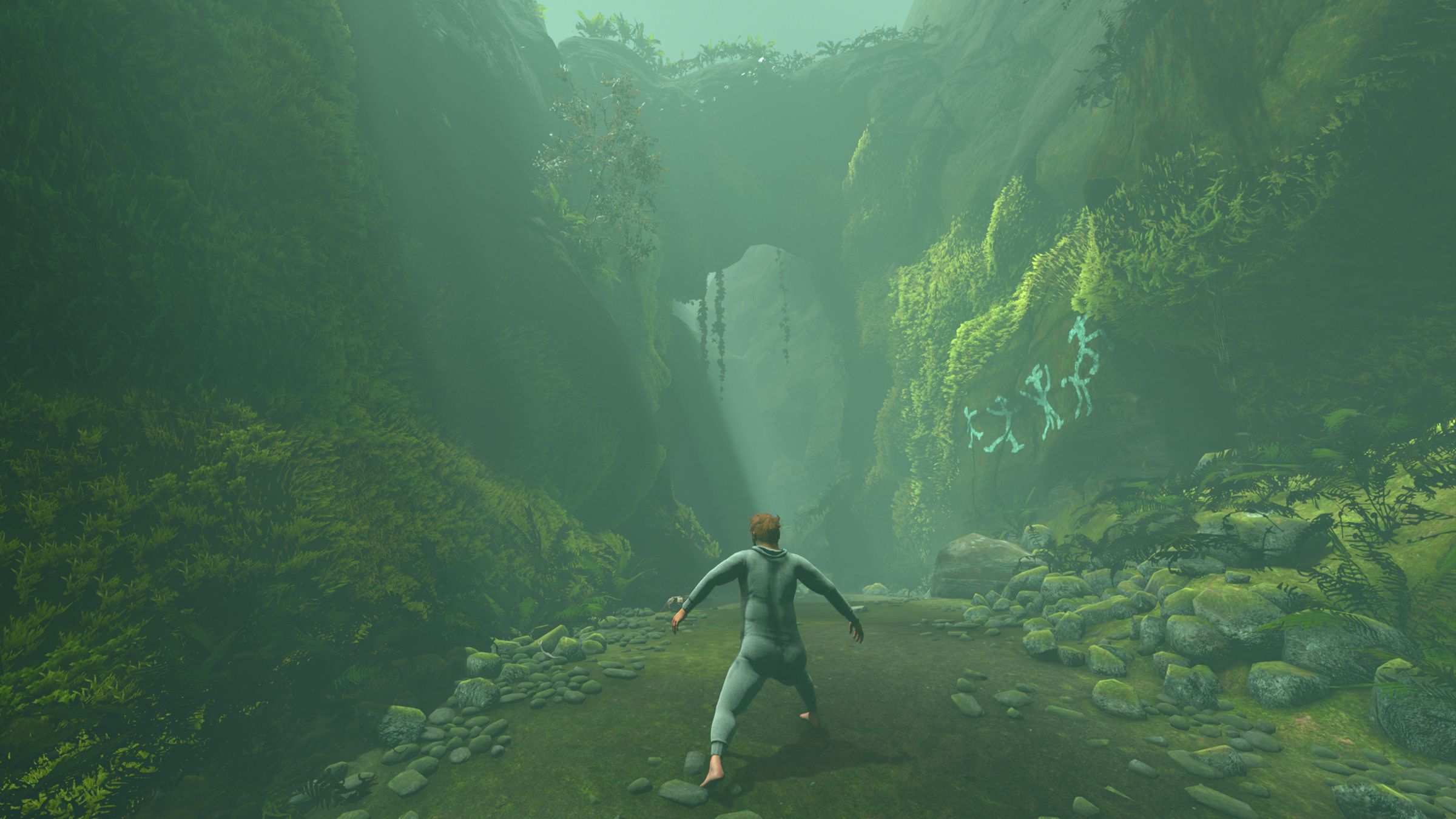Game developer Bennett Foddy was watching a Greek myth unfold in front of him.
A playtester for his latest project, Baby Steps, was struggling to navigate the game’s lead—Nate, a 35-year-old “failson” in a stained onesie—up a slippery hill. Each time, the terrain proved to be too much, and Nate skidded uselessly down it.
Foddy has a reputation for making onerous games that take a little bit of masochism to master. This was not one of those times. Neatly placed next to the slippery hill was a staircase, which Foddy says the player took note of after the third or fourth fall. However, this modern-day Sisyphus refused to quit; he continued to flop Nate’s thick limbs up that hill again and again, and he continued to fall again and again. The playtester’s “intense need to climb that mudslide—it’s funny to me, it’s gratifying as a designer,” says Foddy. “I loved that he was doing it. Like, that’s not productive.”
Unbeknownst to the playtester, he was Foddy’s target audience. Baby Steps, launching September 23 for PlayStation 5 and PC, entreats gamers to examine how much they unconsciously adhere to damaging masculine ideas, including an unwillingness to appear weak or incapable, whether that’s in how well they play a game or how willing they are to sometimes take the L. It makes its hero less like the muscled protagonists of games past and more like the players: unhelpfully stubborn types with what Foddy calls “slightly problematic” views of what it means to succeed that are actually holding them back.
Baby Steps is a failure-to-launch story with an Isekai twist, as Nate is transported from the safety of his parents’ basement couch to an unfamiliar land. In trailers for the game, it’s easy to see what Foddy means. Nate lacks any semblance of a so-called man’s man. He’s awkward, unkempt, and overweight. He fumbles his words and can barely even walk without falling over; players control Nate by literally moving one leg at a time, controls reminiscent of ragdoll runner QWOP, the game that put Foddy on the map. Baby Steps players will likely spend much of their time tumbling off cliffs or pratfalling down gentle hills.
From the start, Foddy says, Nate is offered help by someone who wants to teach him the ropes, give him a pair of shoes, maybe even a map. “And he can’t accept that help,” Foddy says. “To me, that’s a joke about a kind of symbolic masculine self-sufficiency and the limitations of that.” Foddy’s body of work has always been about difficulty and failure; Baby Steps is asking players to consider why they subject themselves to this sort of pain needlessly.
In video games, capital M masculinity has long been the standard for male leads: a (typically white) confident protagonist in good shape, demonstrating unusual strength in a hero role. The idea that games are made by men, for men, has been so pervasive in the history of video games that it’s prompted entire harassment campaigns targeting anyone who doesn’t fit that description. More extreme examples include pockets of online gaming culture where toxic communities persistently reject anyone they deem as “DEI”—women, people of color, marginalized communities—to uphold sexist and racist ideologies.
Illinois Tech digital humanities and media studies professor Carly Kocurek says that while masculine tropes aren’t inherently bad, “they can limit the types of stories that get told and the kinds of ideas that make it to market, which can really dampen creativity and innovation.”
“A lot of pop culture stories and media rely on a shared pool of influences,” says Kocurek. She points to movies like Star Wars that follow the hero’s journey, or fantasy characters like dwarves and elves that have been popularized by J.R.R. Tolkien and other writers. “We get certain ideas about what a hero is, what a man is, and we see them again and again.”
Consider iconic game characters like Halo’s Master Chief, Metal Gear’s Solid Snake, or even Nintendo’s mustachioed plumber, Mario. “Even Spider-Man is kind of represented as a jock in video games,” says Foddy.
Foddy, who developed Baby Steps alongside Ape Out developers Gabe Cuzzilo and Maxi Boch, says that most often, players adopt this role of a savior character—someone capable and self-sufficient who reflects a heroic ideal. Gender doesn’t always matter; Aloy, the heroine from the Horizon series, exhibits just as many masculine ideals as Nathan Drake of Uncharted. When it came to Baby Steps, the team wanted to go in the opposite direction: a character who’s trying to live up to those expectations but just isn’t capable of it.
Still, Foddy says the game is sympathetic to its lead. He’s up to the task and by the game’s end will have scaled an entire mountain; he just doesn’t begin his journey very well equipped.
“He’s a nerd, as is everybody who made the game,” Foddy says. “We’re also gamers, so you know, we’re not out to get gamers.”
Part of Baby Steps involves Nate, who comes from a wealthy family with plenty of opportunity, grappling with his own troublesome behavior. “He’s part of the privileged, white-male default group,” Foddy says. “That’s making his situation more burdensome for him because it underscores that his failures to accomplish success are of his own making.” But the team was not interested in parroting stereotypical bootstrap advice. “We really wanted to resist the kind of boomer morality play of ‘what you really need to do is get a job and start meeting your responsibilities,’ and ‘you’re just lazy and you’re too oriented to pleasure.’”
In playing this character, Foddy hopes people might reflect more on their own motivations and behavior, the why of what they’re doing. During his time as a developer, Foddy has noticed that there is a certain subset of gamers who refuse to take help. They’re the stereotype of a guy who won’t ask for directions or, for example, skips every in-game tutorial.
Others, he says, are of the “git gud” mindset—a slang way to say that you suck at video games and should try harder. Discussions around difficulty and skill have haunted video games spaces for more than a decade, whether it was about playing in online spaces or challenging series like Dark Souls; arguments about player skill versus how hard a game should be are already taking place in the Silksong community, roughly a week after its launch. “Many games really lean into competition as the primary experience,” Kocurek says, “and there is a kind of feedback loop because you get games that embed certain ideals and values that attract certain players who like those.”
Foddy’s games often challenge what he calls “masculine pride” by repeatedly subjecting players to failure. Baby Steps is just a little more open about it in its narrative. Will the lesson land? Hard to say. The playtester determined to conquer the mudslide never did manage to brute-force it. “He started to feel like he was boring us after, you know, half an hour of it,” Foddy says.
Foddy can relate; he too has found himself climbing difficult areas with no reward in other games. “Did I do that for masculine pride,” he says. “Or did I do it because I was actually taking pleasure in the moment-to-moment play? I don’t think we even know why we’re doing it half the time.”




